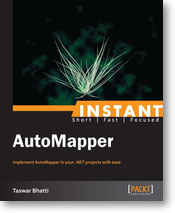Today is my first post to my blog, since its my birthday today so I thought I would start today. One of the things that I know in life is that, one has to keep learning and I would like to say is
“As a pragmatic programmer, one should always invest regularly.”
The Pragmatic Programmer by Andrew Hunt and David Thomas is a must read book. It also comes with tips of all the chapters in a card form bounded at the end of the book. One can stick those tips in your cubicle or office (if you are lucky) just to act smart in front of other developers 🙂
Here are some good excerpt from the book
- Invest regularly. Just as in financial investing, you must invest in your knowledge portfolio regularly. Even if it’s just a small amount, the habit itself is as important as the sums. A few sample goals are listed in the next section.
- Diversify. The more different things you know, the more valuable you are. As a baseline, you need to know the ins and outs of the particular technology you are working with currently. But don’t stop there. The face of computing changes rapidly—hot technology today may well be close to useless (or at least not in demand) tomorrow. The more technologies you are comfortable with, the better you will be able to adjust to change.
- Manage risk. Technology exists along a spectrum from risky, potentially high-reward to low-risk, low-reward standards. It’s not a good idea to invest all of your money in high-risk stocks that might collapse suddenly, nor should you invest all of it conservatively and miss out on possible opportunities. Don’t put all your technical eggs in one basket.
- Buy low, sell high. Learning an emerging technology before it becomes popular can be just as hard as finding an undervalued stock, but the payoff can be just as rewarding. Learning Java when it first came out may have been risky, but it paid off handsomely for the early adopters who are now at the top of that field.
- Review and rebalance. This is a very dynamic industry. That hot technology you started investigating last month might be stone cold by now. Maybe you need to brush up on that database technology that you haven’t used in a while. Or perhaps you could be better positioned for that new job opening if you tried out that other language….
Now that you have some guidelines on what and when to add to your knowledge portfolio, what’s the best way to go about acquiring intellectual capital with which to fund your portfolio? Here are a few suggestions.
- Learn at least one new language every year. Different languages solve the same problems in different ways. By learning several different approaches, you can help broaden your thinking and avoid getting stuck in a rut. Additionally, learning many languages is far easier now, thanks to the wealth of freely available software on the Internet (see page 267).
- Read a technical book each quarter. Bookstores are full of technical books on interesting topics related to your current project. Once you’re in the habit, read a book a month. After you’ve mastered the technologies you’re currently using, branch out and study some that don’t relate to your project.
- Read nontechnical books, too. It is important to remember that computers are used by people—people whose needs you are trying to satisfy. Don’t forget the human side of the equation.
- Take classes. Look for interesting courses at your local community college or university, or perhaps at the next trade show that comes to town.
- Participate in local user groups. Don’t just go and listen, but actively participate. Isolation can be deadly to your career; find out what people are working on outside of your company.
- Experiment with different environments. If you’ve worked only in Windows, play with Unix at home (the freely available Linux is perfect for this). If you’ve used only makefiles and an editor, try an IDE, and vice versa.
- Stay current. Subscribe to trade magazines and other journals (see page 262 for recommendations). Choose some that cover technology different from that of your current project.
- Get wired. Want to know the ins and outs of a new language or other technology? Newsgroups are a great way to find out what experiences other people are having with it, the particular jargon they use, and so on. Surf the Web for papers, commercial sites, and any other sources of information you can find.
Go ahead and purchase this book at amazon since its defintely worth it and would defintely enlighten you on your craft.



Leave A Comment